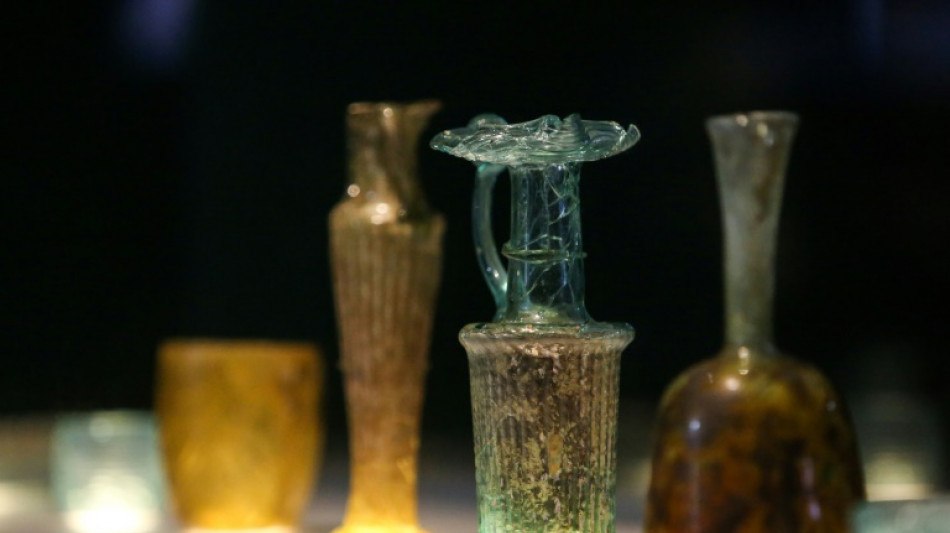
-
 US stocks retreat from records as oil prices jump
US stocks retreat from records as oil prices jump
-
Dortmund outclass Bremen to tighten grip on second spot

-
 Shiffrin reasserts slalom domination ahead of Olympics with Flachau win
Shiffrin reasserts slalom domination ahead of Olympics with Flachau win
-
Fear vies with sorrow at funeral for Venezuelan political prisoner

-
 Pittsburgh Steelers coach Tomlin resigns after 19 years: club
Pittsburgh Steelers coach Tomlin resigns after 19 years: club
-
Russell eager to face Scotland team-mates when Bath play Edinburgh

-
 Undav scores again as Stuttgart sink Frankfurt to go third
Undav scores again as Stuttgart sink Frankfurt to go third
-
Fuming French farmers camp out in Paris despite government pledges

-
 Man Utd appoint Carrick as manager to end of the season
Man Utd appoint Carrick as manager to end of the season
-
Russia strikes power plant, kills four in Ukraine barrage

-
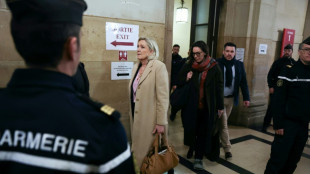 France's Le Pen says had 'no sense' of any offence as appeal trial opens
France's Le Pen says had 'no sense' of any offence as appeal trial opens
-
JPMorgan Chase reports mixed results as Dimon defends Fed chief

-
 Vingegaard targets first Giro while thirsting for third Tour title
Vingegaard targets first Giro while thirsting for third Tour title
-
US pushes forward trade enclave over Armenia

-
 Alpine release reserve driver Doohan ahead of F1 season
Alpine release reserve driver Doohan ahead of F1 season
-
Toulouse's Ntamack out of crunch Champions Cup match against Sale

-
 US takes aim at Muslim Brotherhood in Arab world
US takes aim at Muslim Brotherhood in Arab world
-
Gloucester sign Springbok World Cup-winner Kleyn

-
 Trump tells Iranians 'help on its way' as crackdown toll soars
Trump tells Iranians 'help on its way' as crackdown toll soars
-
Iran threatens death penalty for 'rioters' as concern grows for protester

-
 US ends protection for Somalis amid escalating migrant crackdown
US ends protection for Somalis amid escalating migrant crackdown
-
Oil prices surge following Trump's Iran tariff threat

-
 Fashion student, bodybuilder, footballer: the victims of Iran's crackdown
Fashion student, bodybuilder, footballer: the victims of Iran's crackdown
-
Trump tells Iranians to 'keep protesting', says 'help on its way'

-
 Italian Olympians 'insulted' by torch relay snub
Italian Olympians 'insulted' by torch relay snub
-
Davos braces for Trump's 'America First' onslaught

-
 How AI 'deepfakes' became Elon Musk's latest scandal
How AI 'deepfakes' became Elon Musk's latest scandal
-
Albania's waste-choked rivers worsen deadly floods
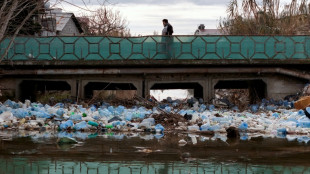
-
 Cancelo rejoins Barca on loan from Al-Hilal
Cancelo rejoins Barca on loan from Al-Hilal
-
India hunts rampaging elephant that killed 20 people

-
 Nuuk, Copenhagen mull Greenland independence in Trump's shadow
Nuuk, Copenhagen mull Greenland independence in Trump's shadow
-
WHO says sugary drinks, alcohol getting cheaper, should be taxed more
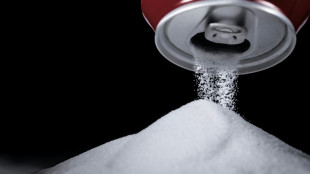
-
 Arteta urges Arsenal to learn from League Cup pain ahead of Chelsea semi
Arteta urges Arsenal to learn from League Cup pain ahead of Chelsea semi
-
Davos elite, devotees of multilateralism, brace for Trump

-
 Spanish star Julio Iglesias accused of sexual assault by two ex-employees
Spanish star Julio Iglesias accused of sexual assault by two ex-employees
-
Trump's Iran tariff threat pushes oil price higher

-
 US consumer inflation holds steady as affordability worries linger
US consumer inflation holds steady as affordability worries linger
-
Iran to press capital crime charges for 'rioters': prosecutors

-
 Denmark, Greenland set for high-stake talks at White House
Denmark, Greenland set for high-stake talks at White House
-
Iranian goes on trial in France ahead of possible prisoner swap

-
 Cold winter and AI boom pushed US emissions increase in 2025
Cold winter and AI boom pushed US emissions increase in 2025
-
Hong Kong activist investor David Webb dies at 60
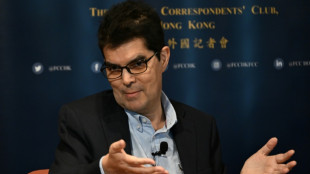
-
 Try to be Mourinho and I'll fail: new Real Madrid coach Arbeloa
Try to be Mourinho and I'll fail: new Real Madrid coach Arbeloa
-
Vingegaard targets Giro d'Italia and Tour de France double

-
 South Korean prosecutors demand death penalty for ex-leader Yoon
South Korean prosecutors demand death penalty for ex-leader Yoon
-
Iwobi hails Nigerian 'unity' with Super Eagles set for Morocco AFCON semi

-
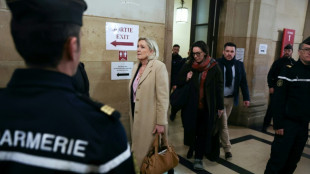 Le Pen appeal trial opens with French presidential bid at stake
Le Pen appeal trial opens with French presidential bid at stake
-
Iran ex-empress urges security forces to join protesters

-
 Sudan 'lost all sources of revenue' in the war: finance minister to AFP
Sudan 'lost all sources of revenue' in the war: finance minister to AFP
-
Freezing rain hampers transport in Central Europe


British Museum showcases ancient vessels smashed in Beirut blast
Eight ancient glass vessels shattered in the 2020 Beirut explosion go on display at the British Museum from Thursday, walking visitors through the painstaking international project to piece them back together.
The vessels, from the Roman, Byzantine and Islamic periods, were reconstructed at the world-famous museum's conservation laboratories, and will be shown as part of its "Shattered Glass of Beirut" showcase, before returning to Lebanon later this year.
"(It) tells a story of near destruction and recovery, of resilience and collaboration," said Hartwig Fischer, Director of the British Museum.
The vessels were among 74 contained within a case at the American University in Beirut (AUB).
The case fell over when the shockwave of the port blast, which occurred three kilometres (two miles) away on August 4, 2020, hit the building, smashing the glass objects inside.
A team of experts had the daunting task of sorting every shard of glass, deciding if it was part of an ancient vessel, rather than display case, and which vessel it belonged to, Duygu Camurcuoglu, a senior conservator at the British Museum, told AFP.
"It's all pretty much done by hand or by eye -- brainwork basically. You have to know certain techniques to be able to carry out this work," she added.
Once the pieces had been sorted, the conservators began the mammoth jigsaw-puzzle exercise of reassembling the vessels.
"It's a case of using an adhesive to reconstruct the vessels," said Camurcuoglu. But they could not just use anything.
"We don't use superglue, we don't use UHU," she joked.
- 'Scars' -
The most challenging vessels were the "large dish and the Byzantine pitcher," Camurcuoglu recalled.
Eighteen of the vessels have so far been conserved as part of an emergency recovery campaign in Beirut, along with the eight vessels at the British Museum and two that emerged unscathed from the fall.
Experts hope that at least half of the remaining 46 objects in Beirut can be conserved soon too.
The collaborative project between the British Museum and the AUB's Archaeological Museum began in 2021, following an offer of help from the London institution.
Conservators agreed early on to make the vessels structurally sound but leave imperfections caused by the shattering visible, bearing witness to the explosion.
The exhibition will take visitors on the journey undergone by the glass vessels, from the moment of the blast to their display in the famous London museum.
Lighting will be used in the display to illuminate cracks and gaps in the glass.
"We really wanted to highlight the damage these objects went through, so we can all look at the scars, and remember how they were revived together," said Camurcuoglu.
The vessels are considered important in telling the story of the development of revolutionary glass-blowing techniques in Lebanon in the 1st century BC, enabling the mass production of glass objects and making them available for common use.
Their restoration, and the teamwork involved, is a source of pride to the conservators, said Camurcuoglu.
"We all individually felt that, I think, we contributed to something by working on these objects -- by sharing this pain, these emotions.
"So it's not only about the conservation... but also the working together and achieving something together," she added.
U.AlSharif--SF-PST



